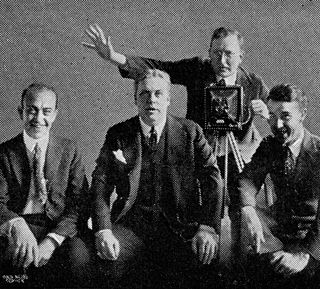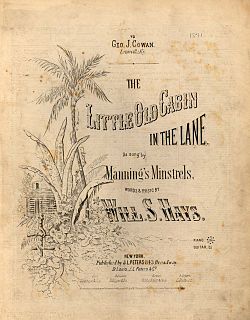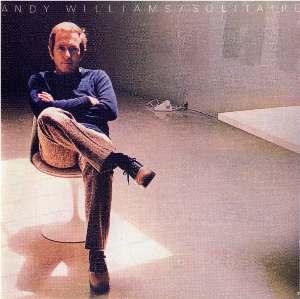"Scarborough Fair" is a traditional English ballad. The song, which is a variant of The Elfin Knight, lists a number of impossible tasks given to a former lover who lives in Scarborough, North Yorkshire. The "Scarborough Fair" variant was most common in the Yorkshire and Northumbria, where it was sung to various melodies, with refrains resembling "parsley, sage, rosemary and thyme" and "Then she'll be a true love of mine."

The Peerless Quartet was an American vocal group that recorded in the early years of the twentieth century. They formed to record for Columbia Records, where they were credited as the Columbia Quartet or Columbia Male Quartet. From about 1907, when they began to record for record labels other than Columbia, they were more widely known as the Peerless Quartet.

"Home, Sweet Home" is a song adapted from American actor and dramatist John Howard Payne's 1823 opera Clari, or the Maid of Milan, the song's melody was composed by Englishman Sir Henry Bishop with lyrics by Payne. Bishop had earlier published a more elaborate version of this melody, naming it "A Sicilian Air", but he later confessed to having written it himself.

"My Melancholy Baby" is a popular song published in 1912 and first sung publicly by William Frawley. The music was written by Ernie Burnett (1884–1959), the lyrics by George A. Norton.

"Let Me Call You Sweetheart" is a popular song, with music by Leo Friedman and lyrics by Beth Slater Whitson. The song was published in 1910 and was a huge hit for the Peerless Quartet in 1911. A recording by Arthur Clough was very popular the same year too. A 1924 recording identifies a Spanish title, "Déjame llamarte mía".
"He's Got the Whole World in His Hands" is a traditional African-American spiritual, first published in 1927. It became an international pop hit in 1957–58 in a recording by English singer Laurie London, and has been recorded by many other singers and choirs.

"Rock-a-Bye Your Baby with a Dixie Melody" is a popular song written by Jean Schwartz, with lyrics by Sam M. Lewis and Joe Young. The song was introduced by Al Jolson in the Broadway musical Sinbad and published in 1918.

Lonely Street is the fifth studio album by American pop singer Andy Williams, released in late 1959 through Cadence Records. This, his fifth LP of new material for the label, is described by William Ruhlmann on AllMusic.com as "an album full of songs of lost love and loneliness that found Williams using more of the Mel Tormé-like foggy lower register of his voice." The liner notes on the back of the album jacket read, "The selections in Lonely Street, Andy confides, are those for which he feels a special affection. Every vocalist has a few personal favorites... and it is quite clear to the listener that this collection presents songs which Andy Williams believes, feels -- and loves."
"I Let a Song Go Out of My Heart" is a 1938 composition by Duke Ellington, with lyrics added by Irving Mills, Henry Nemo and John Redmond. The song became a number one hit for Ellington in 1938. Other hit versions the same year were by Benny Goodman, Connee Boswell, Hot Lips Page, and Mildred Bailey. It was performed as part of The Cotton Club Parade of 1938.

"Keep on Singing" is a 1973 song composed by Danny Janssen and Bobby Hart, best known as a hit single by Helen Reddy. It was originally recorded by Austin Roberts from the album Austin Roberts. It was released as a single on Chelsea Records and reached No. 50 on the U.S. Billboard Hot 100 and No. 39 on the Cash Box Top 100. In Canada it reached # 79.
"Listen to the Mocking Bird" (1855) is an American popular song of the mid-19th century. Its lyrics were composed by Septimus Winner under the pseudonym "Alice Hawthorne", and its music was by Richard Milburn.

"Down by the Old Mill Stream" is a song written by Tell Taylor. It was one of the most popular songs of the early 20th century. The publisher, Forster Music Publisher, Inc., sold 4 million copies.

"The Little Old Log Cabin In The Lane" is a popular song written by Will S. Hays in 1871 for the minstrel trade. Written in dialect, the song tells of an elderly man, presumably a slave or former slave, passing his later years in a broken-down old log cabin. The title is from a refrain: "de little old log cabin in de lane".
"Alone Together" is a song composed by Arthur Schwartz with lyrics by Howard Dietz. It was introduced in the Broadway musical Flying Colors in 1932 by Jean Sargent.
"Doggin' Around" is a 1960 song written by Lena Agree and originally performed by Jackie Wilson. Reaching both the R&B and the pop singles charts in the U.S., "Doggin' Around" hit number one on the Hot R&B Sides chart for three weeks and peaked at number fifteen on the Billboard Hot 100. The A-side of the single was "Night", based on the aria "My Heart at Thy Sweet Voice" from the opera Samson and Delilah, by Saint-Saëns; it made the top five on the R&B and pop charts.

"(You're My Heart's Desire, I Love You) Nellie Dean" is a sentimental ballad in common time by Henry W. Armstrong, published in 1905 by M. Witmark & Sons of New York City. The original sheet music is scored in B-flat major for voice and piano and marked andante moderato.
"Into Each Life Some Rain Must Fall" is a 1944 song performed as a duet by The Ink Spots, featuring Bill Kenny, and Ella Fitzgerald. Their recording was made on August 30, 1944 for Decca Records. The song was written by Allan Roberts (lyrics) and Doris Fisher (melody). The name of the song originates from a quotation of Henry Wadsworth Longfellow from the poem "Rainy Day". The song has also been included in the soundtrack for several videogames.
"There's a Rainbow 'Round My Shoulder" is a 1928 song sung by Al Jolson in the early Warner Bros. talking picture The Singing Fool the same year. The song, along with "Sonny Boy" and "I'm Sitting on Top of the World", which were also in The Singing Fool, were big hits for Jolson. The song was written by Al Jolson, Billy Rose and Dave Dreyer.

Solitaire is the thirty-first studio album by American pop singer Andy Williams, released in the fall of 1973 by Columbia Records and was an attempt to move away from his formulaic series of recent releases that relied heavily on songs that other artists had made popular.

The Best Days of My Life is an album by American pop singer Johnny Mathis that was released on January 29, 1979, by Columbia Records and scaled back considerably on his more than decade-long practice of recording recent hit songs by other artists. He did, however, cover two standards: "As Time Goes By" and "Begin the Beguine", the latter of which is given a disco arrangement.












